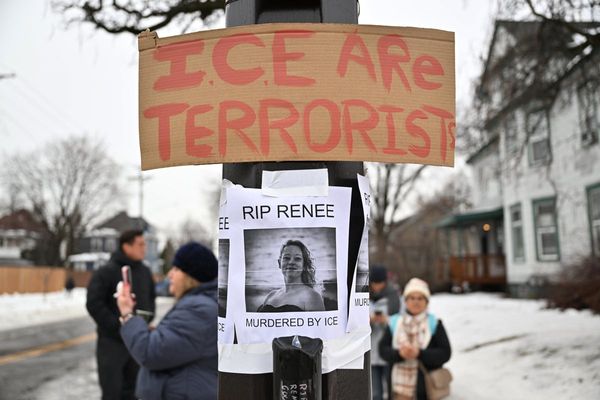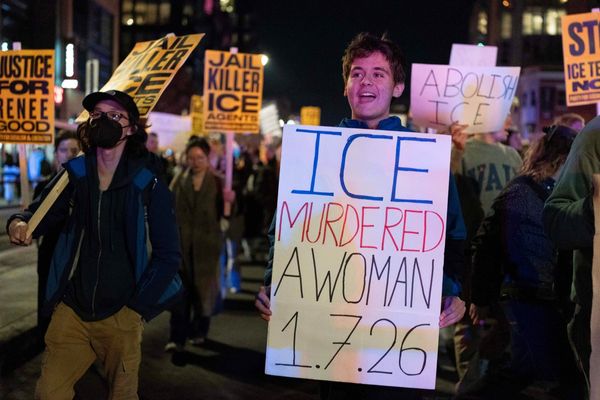
Good morning. The attack on a Manchester synagogue on Yom Kippur yesterday was among the worst acts of antisemitic terrorism in modern British history. The perpetrator, wearing what appears to have been a fake explosive device, drove a car at members of the public and stabbed others before seeking entry to the synagogue, where a large number of Jewish congregants were inside; even with armed police arriving and killing him within minutes, the attack claimed the lives of two people and seriously injured three others.
Today, Jewish people across the UK are in mourning for those who died, and seeing an elevated police presence at synagogues and in their communities. Greater Manchester police have identified the attacker as Jihad Al-Shamie, 35, a British citizen of Syrian descent, and early this morning named the two men killed as Adrian Daulby, 53, and Melvin Cravitz, 66.
Today’s newsletter explains what we know about an act of horrifying violence. Here are the headlines.
Five big stories
Gaza | Hamas will demand key revisions to Donald Trump’s Gaza ceasefire proposal but is likely to accept the plan in coming days as a basis for renewed negotiations, analysts and sources close to the group say.
Economy | Rachel Reeves could raise as much as £45bn in taxes without breaking Labour’s manifesto promises, according to a City report. Economists at the US investment bank Morgan Stanley said they expected the chancellor to use next month’s budget to announce billions of pounds in tax increases to cover a potential £30bn shortfall in the public finances.
Conservatives | Kemi Badenoch is expected to announce a plan this weekend to leave the European convention on human rights if the Conservatives win the next election, as the party attempts to halt a loss of support to Reform.
Health | At-home abortions should be allowed for up to 12 weeks of pregnancy across the UK, according to academics, after a study found they were just as safe and effective as hospital care.
Business | The Asahi group, Japan’s biggest brewery, is reportedly just days away from running out of its most popular beer, as it struggles to recover from a cyber-attack that caused a system outage.
In depth: ‘It really feels like a watershed moment’
Yom Kippur, which means “day of atonement”, is the holiest day in the Jewish calendar, when thousands of British Jews attend synagogue to pray for the forgiveness for their sins. One of the cornerstone readings, from Leviticus, says: “For on this day atonement shall be made for you, to cleanse you; from all your sins you shall be clean before the Lord.”
Heaton Park Hebrew Congregation synagogue, in the Crumpsall area of north Manchester, serves an Orthodox congregation who are part of the UK’s largest Jewish population outside London. Local councillor Russell Bernstein, who got married at the synagogue in 1984, described it to the Manchester Evening News as “a welcoming, community place” and “one of the pivotal worship spaces” for the local Jewish community. A morning service started at 9 o’clock yesterday. At 9.31am, Greater Manchester police received a call saying that an attack was under way.
***
What do we know about the incident?
The 999 call reported that a car had been driven towards members of the public, and one man had been stabbed. At 9.34am, firearms officers were deployed, and Operation Plato – a designation for elevated emergency services’ response to major incidents including “marauding terrorist attacks” – was declared a few minutes later. At 9.38am, firearms officers shot the attacker.
An eyewitness told the BBC that he had seen one man bleeding badly on the ground, and another lying down in front of a car. Then he saw another man “stabbing the window” of a nearby building, the synagogue, and “trying to get in”. “Within seconds, the police arrived, they gave him a couple of warnings, he didn’t listen so they opened fire,” he said.
Footage circulating online confirmed that account, and showed a police officer telling bystanders: “he has a bomb – go away”. Shortly after that warning, the suspected attacker started to get up, and the police opened fire again.
Inside, the doors were barricaded; one worshipper, Rob Kanter, said that he felt “bewildered, because I think the adrenaline kicks in”, but that there was a “relatively calm” mood inside. Chief constable Sir Stephen Watson said that “the immediate bravery of security staff and worshippers inside, and the fast response of the police” stopped the attacker from getting in.
At 12.11pm, Greater Manchester police confirmed that two people had been killed in the attack, with others seriously injured. Police said that the suspected attacker was believed to be dead, but that it could not immediately be confirmed because of “safety issues” around “suspicious items on his person”.
An image of the suspect taken before he was shot showed him with at least three objects at his waist; police said that he appeared to be wearing a “suspicious device”. A bomb disposal unit attended the scene, and carried out three controlled explosions, including on the suspect’s car. The suspected device he was carrying was ultimately found not to be viable. His death was confirmed later in the afternoon.
The attacker, named as 35-year-old Jihad Al-Shamie, was a British citizen of Syrian descent, police said. He arrived in the UK as a young child and was granted citizenship in 2006. Two men in their 30s and a woman in her 60s were later arrested on suspicion of the commission, preparation and instigation of acts of terrorism.
After worshippers were evacuated by police, Kanter said, Rabbi Daniel Walker carried out part of the interrupted service: “Our rabbi’s role was to try and say, yes, this is a terrible tragedy, but we want to try where possible to remember today as Yom Kippur.”
***
What was the mood at the scene in the aftermath?
Observant Jews largely avoid technology on Yom Kippur, which may have delayed the spread of the news; some members of the synagogue ran door to door to warn people, it was reported. But some members of the local Jewish community and others gathered at the cordon and expressed their horror at the incident.
Josh Halliday, the Guardian’s north of England editor, lives nearby and arrived at the scene at about 10.30am. One woman told him that she was unable to reach her husband and son inside the synagogue.
Another, Olivia Gold, said: “I’m absolutely distraught. This will be devastating for a long time. I just wish they would leave us alone. We’re a quiet community. It’s just horrendous. We don’t harm anybody, we don’t force our views on anybody.” A Jewish man also at the scene said: “It is the holiest day of the year and we get this. There is no place for Jews in Britain any more. It’s over.”
Jewish and Muslim communities live alongside each other in the area, said Josh, whose account of the day captures a mood of despair and disbelief. “There hasn’t been a significant history of attacks on places of worship or other incidents. A lot of the people I spoke to described living here for many years and never feeling any animosity. People here have felt able to walk around showing visible signs of their faith even since 7 October. So this is extremely shocking to them. It really feels like a watershed moment.”
***
Does this incident form part of a larger pattern?
As reports came in of suspicions that the suspect was carrying a bomb, every synagogue in Greater Manchester boosted security. In London, mayor Sadiq Khan said that the Met would be “stepping up high visibility policing in and around synagogues”, while Keir Starmer said that there would also be “additional police assets” at synagogues across the country.
There was already an elevated security presence at many synagogues, to account for the large numbers of people attending on one of Judaism’s high holidays. Since the 7 October attack by Hamas in Israel, and subsequent war in Gaza, there has been a sharp increase in reports of antisemitism recorded by the Community Security Trust: 4,296 in 2023, a record, and 1,521 in January-June 2025. Those figures should be put in the context of the country’s small Jewish contingent: as of the last census there were 287,360 people who identified as Jewish in England and Wales, just 0.5% of the population.
About 9% of the incidents in the first six months of this year featured violence. Just four months ago, the Jewish community near the synagogue was targeted with antisemitic graffiti, with “Nazi Jews are scum” sprayed outside synagogues and kosher restaurants.
Even against that grim record, yesterday’s attack stands alone as the worst attack on Jewish people in the UK in living memory. Amid messages of solidarity and support from politicians, King Charles, and faith leaders, Imam Qari Asim, the co-chair of the British Muslim Network, said that his thoughts were with the victims, their families, and the Jewish community, adding: “British Jews, British Muslims and all communities must be able to live together without violence.”
Chief rabbi Sir Ephraim Mirvis called the attack the “tragic result” of an “unrelenting wave of Jew hatred”. And he said: “This is the day we hoped we would never see, but which deep down, we knew would come.”
***
What will drive the investigation into the incident now?
The suspect is not thought to have been under current investigation, and his name does not appear in initial searches of counter-terrorism files; further searches are being conducted to see if he was mentioned in connection to other investigations.
Meanwhile, and before any detail emerges of the three people arrested in connection to the attack, investigators are seeking to locate and examine his electronic devices for information on his internet browsing history, his contacts, and any other information that might indicate what radicalised him.
There is not believed to be any ongoing threat to the public. In this piece, Dan Sabbagh notes that the attack was not sophisticated, and that plots directed from overseas are now a rarity. But he adds that “MI5 and counter-terrorism police will operate at a heightened state of alert in the coming weeks” as they monitor risks of further attacks around the second anniversary of the 7 October attack.
What else we’ve been reading
Refugees who left Darfur and Khartoum for South Sudan are being targeted by both sides of the horrendous civil war. Carlos Mureithi’s piece is a difficult but important read on the shocking number of refugees who have been killed, abducted, and brutally maimed. Aamna
At the Labour conference, Andy Beckett felt a “more urgent, potentially more realistic approach” to power. His column is a smart study of how crises can energise governments – but notes that if Labour’s more self-critical moment does not translate into a more coherent vision, “[this] may turn out to have been the first phase of a post-Starmer age”. Archie
When someone next tells me they’re going to see the pyramids, I’ll now ask them to clarify whether they mean the ones in Egypt, or the 75 pyramid structures one man found in the US. Aamna
Robert Topinka, who we spoke to about the “Boriswave” coinage on the far right last week, now has a great piece about how Donald Trump mastered shitposting – a mode of discourse that presents as satire, but amounts to “an incoherent politics of cruelty”. Archie
The United States government has shut down. Finally, as Robert Reich argues, the Democrats have leverage over the Trump administration. They must not squander it. Aamna
Sport
Football | Nottingham Forest boss Ange Postecoglou faced anger from his own fans after his team’s 3-2 Europa League defeat to Midtjylland in the Europa League. Aston Villa beat Feyenoord 2-0 in Rotterdam to make it back-to-back Europa League wins. Crystal Palace opened their Conference League campaign with a 2-0 win over Dynamo Kyiv to set a new club record run of 19 unbeaten matches.
Winter Olympics | Cross-country running and cyclocross have a good chance of being added to the 2030 Winter Olympics in France, Sebastian Coe has predicted, as part of what could be the biggest overhaul of the Games in a generation.
Rugby union | While the majority of British and Irish Lions squad members are not being permitted to resume playing for their clubs until next week, Leicester’s new club captain Ollie Chessum has been cleared to return to domestic action against Harlequins
The front pages
The events in Manchester dominate the front pages on Friday; the Guardian leading with “Terrorist kills two people at Manchester synagogue”. The Times has “Terror on Yom Kippur”, while the Mirror goes with “Terror at the synagogue”. The Financial Times says “Two killed in knife and vehicle attack at Manchester synagogue”.
The Telegraph reports “Israel blames Starmer after synagogue terror rampage”, while the i says “Bravery of rabbi and worshippers saves many lives”. The Mail has “He was an Islamic terrorist” and finally the Sun simply leads with “7 minutes of evil”.
Something for the weekend
Our critics’ roundup of the best things to watch, read, play and listen to right now
Music
Taylor Swift: The Life of a Showgirl | ★★☆☆☆
There are albums for which vast success seems preordained, and then there is The Life of a Showgirl. The album – a crisp 12 songs in 40 minutes – sees Taylor Swift collaborate with Max Martin and Shellback, the Swedish duo who co-wrote and produced her most forthright pop bangers. But anyone anticipating something similar from Showgirl is in for a shock: the fizzing electronic pop of Reputation and 1989 is conspicuously absent. More startling still is the distinct lack of undeniable hooks and nailed-on melodies. The album isn’t terrible: it’s just nowhere near as good as it should be given Swift’s talents. Alexis Petridis
TV
Disclosure: Care Home Undercover | ★★★★☆
BBC Scotland journalist Catriona MacPhee went undercover, working as a cleaner at the Castlehill Care Home in Inverness. When people first looked at the home, they want to move in too. But by the time you finish MacPhee’s hour-long film, you will have little doubt that the image Castlehill presents to the outside world – complete with champagne and fine dining – couldn’t be further from the appalling reality. Hannah J Davies
Film
Don’t Let’s Go to the Dogs Tonight | ★★★★☆
The screen actor Embeth Davidtz makes a great feature directing debut with this utterly heartfelt, beautifully shot and meticulously realised movie in which she also stars – clearly a passion project – showing a troubled world through the unjudging eyes of a child. It is an adaptation of Alexandra Fuller’s award-winning memoir of the same name, about her childhood in Zimbabwe (then Rhodesia) in the late 1970s, just before the election that brought Robert Mugabe to power ended white minority rule. There’s a lovely performance from seven-year-old newcomer Lexi Venter as Bobo, and a tremendous performance from Zikhona Bali, who plays black nanny-maidservant Sarah. Peter Bradshaw
Theatre
Cheapo (Òran Mór, Glasgow) | ★★★☆☆
Kyla MacDougall, played by Yolanda Mitchell, is introduced to the audience as a teenager with frightening self-assurance; while her nerdy classmate Jamie Sheldon, played by Testimony Adegbite, struggles to complete sentences. The more Kyla threatens Jamie, however the more it becomes apparent that, while he is trapped in a tough corner, the real victim is her. The play, staged on a chequered set, is a slippery to-and-fro of strategy, speculation and cunning, as the teenagers search for options to escape what feels like the inevitable checkmate, but might just go beyond a binary black and white. Mark Fisher
Today in Focus
Is TikTok about to go full Maga?
Investigative journalist Emily Baker-White on the deal to transfer TikTok’s US operations to Trump allies.
Cartoon of the day | Ben Jennings
The Upside
A bit of good news to remind you that the world’s not all bad
Researchers are desperate to learn more about the last remaining sub-species of orcas in the San Juan Islands, nestled between the US and Canada. The species face extinction due to a sharp decline in their primary food source, but monitoring techniques are invasive and lead to deaths of the wales. The new solution? Scent detection dogs and drones.
Both have been crucial in studying the whale faeces, allowing researchers to uncover a wealth of biological insights from a single sample, including diet, hormone levels, exposure to toxins, pregnancy, gut microbiome composition and the amount of microplastics in their system, as well as the presence of parasites, bacteria and fungi.
Sign up here for a weekly roundup of The Upside, sent to you every Sunday
Bored at work?
And finally, the Guardian’s puzzles are here to keep you entertained throughout the day. Until Monday.







